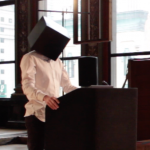A Tag, Not a Folder

The "electronicness" in literary writing, Ian Hatcher suggests, is more of a cognitive disposition, an atmosphere or condition that is present regardless of the print/screen/pen(cil)/paper medium one inhabits.
This series of short interventions were made at the “Futures of Electronic Literature” discussion at the bi-annual Electronic Literature Organization conference in 2012. Titled “Electrifying Literature: Affordances and Constraints,” the conference took place at West Virginia University in Morgantown on June 20th to June 23rd. The contributors were organized by Stephanie Strickland to offer suggestions on how to improve the organization as it attempts to re-define its mission in a shifting cultural, economic, and technological landscape. Ranging from the concrete to the poetic to the theoretical, the following nine short statements were made by a group of emerging artists, scholars, and practitioners from a variety of disciplines and backgrounds.
My association with the ELO began when I was an art student, progressed through my time in graduate school, and now I come to it as what I sometimes half-ironically term a ‘free agent’-an artist unattached to an academic institution, working a day job. The ELO has been a supportive force for me and a nexus of international community, for which I’m grateful.⏴Marginnote gloss1⏴Luesebrink & Strickland: Stephanie Boluk places us “amidst [a] tempestuous and contestatory media ecology.” The terms “digital” and “electronic” begin to seem to her, and others, outdated, co-opted, or past their prime in terms of rhetorical usefulness. Ian Hatcher finds them too constraining. They should not be used to label technology-aware writing practices if they establish a Procrustean category (folder) as opposed to being one descriptor among others (tag). […]
See the full commentary
— Stephanie Strickland and Marjorie Luesebrink (Dec 2014) ↩
One point upon which I think there is a lot of agreement [both before the conference, in various conversations, and looking back at it, as I compile these notes] is that the notion of ‘electronic’ writing is shifting. Nearly all writing, in the developed world at least, is arguably in some degree ‘electronic’. I’ve heard multiple people suggest that the ELO is not so much making headway in convincing larger art/writing circles to acknowledge digital systems as legitimate platforms for literary work as the platforms are becoming so pervasive that it is increasingly hard to ignore them. From my own perspective, even when writing with a pen by candlelight [as I was yesterday, in the unpowered aftermath of Hurrican Sandy] I strongly suspect there are still notes of ‘electronicness’ to be detected in my approach to language, due to the sheer amount of time I’ve spent in front of screens and working with code. My memory and conceptions of space and time are imprinted with the logics of digital systems.
But all language is slippery, or course, and the term ‘electronic literature’ is a useful one. I’m not making a case for its obsolescence. Rather I’m interested in taking the above as a place to start thinking about the future of the term and organization in tandem.
One complaint I’ve heard often in the ELO community, and justifiably so, is that other, older-school writing communities are reluctant to acknowledge digitally inflected works as ‘writing’. However it’s also rare to hear members of the ELO acknowledging forms of writing from outside this community - from outside the particulars of our own aggregated practices - as ‘electronic.’ Occasionally when explicit digital elements are present, yes, but what about conceptually ‘electronic’ work? There are historical exceptions - Borges, Burroughs et al - but few contemporary writers from outside the ELO are given credit for producing ‘electronic literature.’ Yet at the same time this community seems to be expanding, or exploding, its notions of what fits under its umbrella. At ELO 2012, code and text peculiarly and productively coexist with performance and music and other New Weird Electronic hybrid forms.
What I’m getting at is this: Let’s apply ‘electronic’ as a tag, not a folder. Apply it generously, even expansively; apply it to writing from outside this community, apply it creatively and provocatively. When everything is electronic in degrees (as everything is art or poetry in degrees), the question becomes what is useful or potentially enlightening to tag as such, to bring into new or renewed resonance with what the ELO is already discussing and producing, with what is going on in larger digital culture. For me this question leads into exciting possibilities for cross-pollination, publication, and curation. And also for grappling with the digital power structures of our time. The politics of data mining, privacy, and language collection/filtration (Google) seem especially crucial for us to be seeking avenues of engagement with, as digital literary works could be incisive and useful tools of cultural intervention on those fronts.
All this said, there remain questions as to how synonymous “ELO” and “electronic literature” should be, and how large a tent the ELO is interested in pitching. Semantically, it could be nearly as wide as the internet itself. Right now it mostly just covers us. Who might it include in the future?⏴Marginnote gloss2⏴E-Lit Futures 2012 Forum: Next in Line Jhave
— Dibs (Feb 2014) ↩
Ian Hatcher is a text/sound/performance artist and programmer. He holds degrees in art and writing from SAIC and Brown University, and lives in New York City.
Cite this article
Hatcher, Ian. "A Tag, Not a Folder" Electronic Book Review, 1 March 2014, https://electronicbookreview.com/publications/a-tag-not-a-folder/